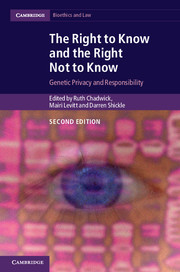Book contents
- Frontmatter
- Contents
- List of contributors
- Acknowledgements
- Introduction
- Part I Philosophical and legal issues
- 1 The right to know and the right not to know: the emerging debate
- 2 Autonomy and a right not to know
- 3 Privacy and the right not to know: a plea for conceptual clarity
- Part II Issues in genetics
- Part III Emerging issues
- Index
- References
2 - Autonomy and a right not to know
Published online by Cambridge University Press: 05 September 2014
- Frontmatter
- Contents
- List of contributors
- Acknowledgements
- Introduction
- Part I Philosophical and legal issues
- 1 The right to know and the right not to know: the emerging debate
- 2 Autonomy and a right not to know
- 3 Privacy and the right not to know: a plea for conceptual clarity
- Part II Issues in genetics
- Part III Emerging issues
- Index
- References
Summary
A problem out of a problem
Genetics and diseases of genetic origin inescapably involve families. Thus genetic information obtained by testing one person may contain information of the same kind on one or more other persons. These other persons are, so to speak, being tested indirectly by the original test. Now, the justification for testing the first person is the recognition that this person has an interest in knowing the relevant information. The knowledge may be sought to gain a better background for reproductive decisions or for undertaking measures preventive of future health problems caused by genetic disease or susceptibility. This leads to the conclusion that each of the other persons concerned has the same interest in knowing the information about herself or himself.
But suppose the person who has undergone the test does not want the findings to be passed on to the other family members? In its report on the ethical issues of genetic screening the Nuffield Council on Bioethics offers the following example:
A man diagnosed with a mild form of adrenoleukodystrophy (ALD), an X-linked condition that can be carried by healthy females, did not wish his diagnosis or the genetic implications to be discussed with his family. Seven years later, his niece gave birth to two successive boys who have a more severe form of ALD. The illness only came to light in them when the elder boy started to display symptoms. The mother’s sister, the man’s other niece, has also given birth to a son subsequently diagnosed with ALD. Both families are bitterly resentful that the medical services did not warn them of their genetic risk.
(Nuffield Council on Bioethics 1993, p. 42)Information
- Type
- Chapter
- Information
- The Right to Know and the Right Not to KnowGenetic Privacy and Responsibility, pp. 24 - 37Publisher: Cambridge University PressPrint publication year: 2014
References
Accessibility standard: Unknown
- 7
- Cited by
